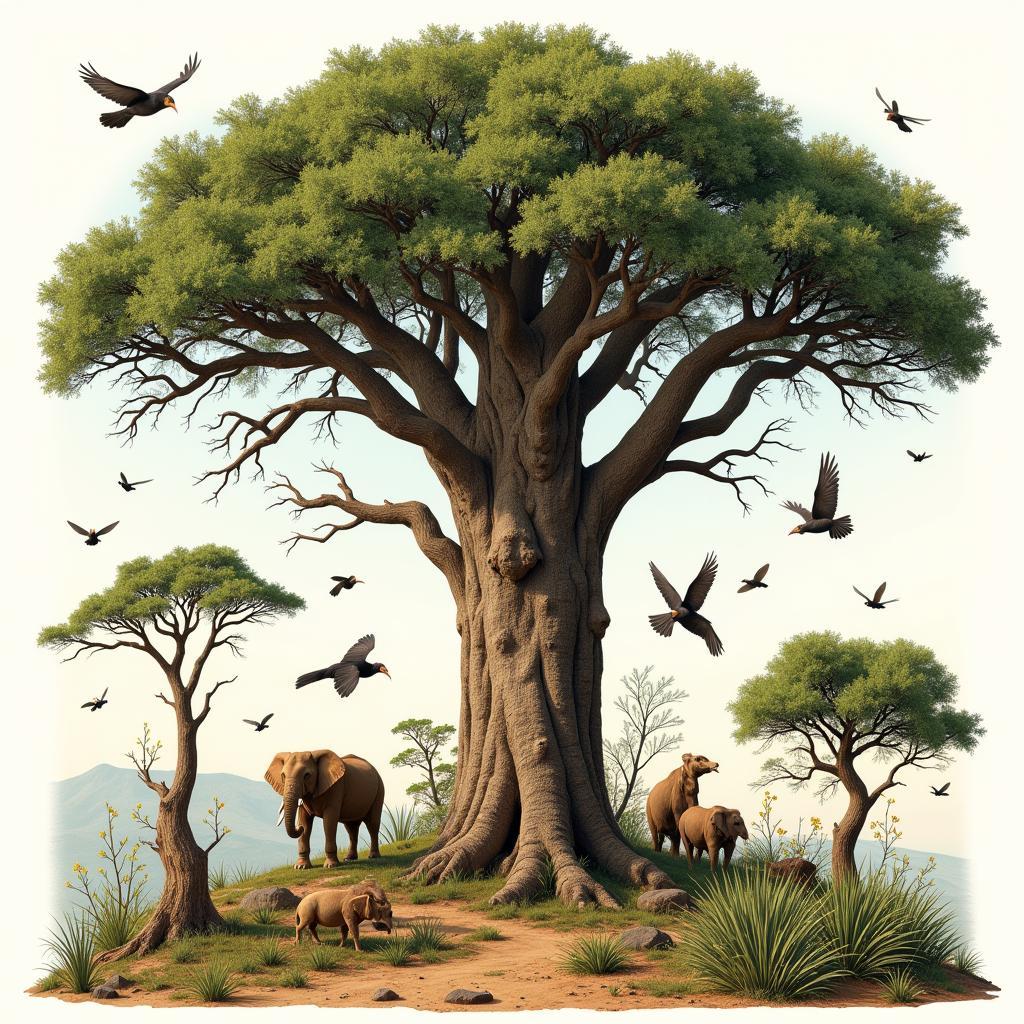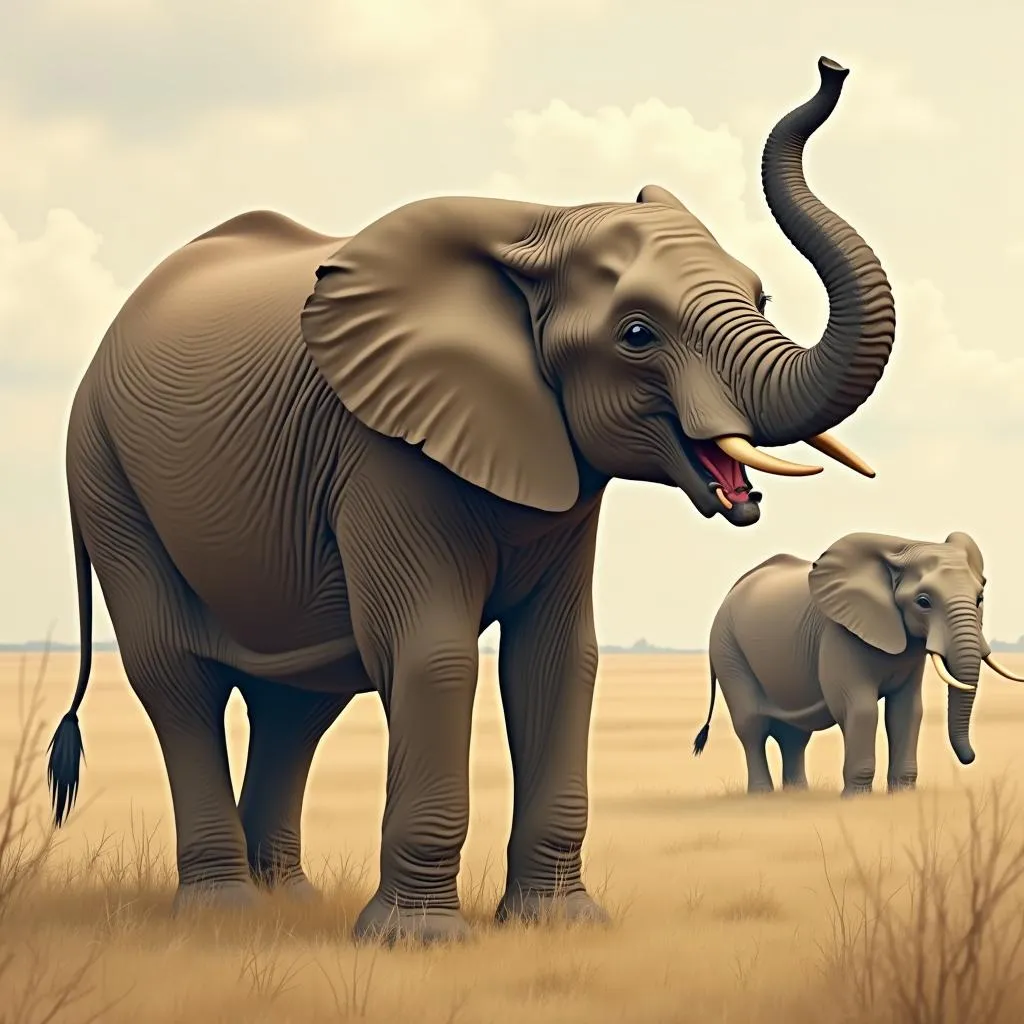10 Facts About African Elephants
African elephants, the largest land mammals on Earth, are iconic symbols of the African savanna. These gentle giants play a crucial role in their ecosystem, and learning more about them is a journey into the heart of Africa’s wild beauty.
These magnificent creatures are more than just their size; they possess a complex social structure and surprising intelligence. Let’s delve into 10 fascinating facts about African elephants that highlight their unique characteristics and the challenges they face.
Unbelievable Size and Strength of African Elephants
The sheer size of African elephants is astounding. They can reach heights of up to 13 feet at the shoulder and weigh between 5,000 to 14,000 pounds. Their massive tusks, made of ivory, are used for digging, foraging, and defense. These incredible creatures can also lift enormous weights, and their powerful trunks are capable of delicate tasks like picking up a single blade of grass.
The Importance of Family: African Elephant Social Structures
African elephants live in complex matriarchal societies led by the oldest and most experienced female, the matriarch. These family groups, known as herds, can consist of up to 100 individuals, including females and their young. Males typically leave the herd upon reaching adolescence. This tight-knit social structure is crucial for their survival and the passing down of knowledge from one generation to the next.
10 interesting facts about african elephants
Communication: How African Elephants Talk
Elephants communicate in fascinating ways, using a combination of low-frequency rumbles, infrasound calls, and body language. These low-frequency rumbles, inaudible to the human ear, can travel for miles, allowing elephants to communicate over long distances. They also use their sensitive feet to detect vibrations in the ground, further enhancing their communication abilities. What language do African elephants speak? While not a language in the human sense, their complex communication system allows them to express a wide range of emotions and share vital information.
What Do African Elephants Eat? A Look at Their Diet
African elephants are herbivores, consuming a vast quantity of vegetation daily. Their diet consists of grasses, leaves, bark, fruits, and roots. They spend a significant portion of their day foraging for food, playing a vital role in shaping their environment by clearing vegetation and dispersing seeds. african grassland trees
The Incredible Trunk: A Multi-Purpose Tool
The elephant’s trunk is a marvel of nature. It is a highly sensitive and versatile organ used for breathing, smelling, touching, drinking, and grasping objects. The trunk has over 40,000 muscles, allowing for incredible dexterity and strength. It’s no wonder this appendage is essential for their survival. How strong is an African elephant’s trunk? It’s strong enough to lift heavy logs and delicate enough to pluck a single leaf.
Threats to African Elephants: Poaching and Habitat Loss
Sadly, African elephants face significant threats, primarily from poaching for their ivory tusks and habitat loss due to human encroachment. These threats have led to a decline in elephant populations, highlighting the urgent need for conservation efforts.
african jungle animals in herds pictures
The Intelligence of African Elephants: Problem-Solving and Memory
African elephants are highly intelligent animals, demonstrating remarkable problem-solving abilities and exceptional memory. They can remember routes to water sources, recognize individuals, and even exhibit signs of grief and empathy. Dr. Joyce Poole, a renowned elephant researcher, notes, “Elephants possess a complex social intelligence that rivals that of primates. Their memory and capacity for learning are truly remarkable.”
Lifespan of African Elephants: How Long Do They Live?
African elephants have a relatively long lifespan, living for up to 70 years in the wild. This longevity allows for the passing down of crucial knowledge and skills within the herd, ensuring their continued survival.
The Role of African Elephants in the Ecosystem
African elephants play a critical role in their ecosystem as “ecosystem engineers.” Their foraging habits shape the landscape, creating pathways and clearings that benefit other animals. They also disperse seeds, contributing to the biodiversity of their habitat.
10 interesting facts about the african savanna
Conservation Efforts: Protecting African Elephants for Future Generations
Protecting these magnificent creatures requires concerted conservation efforts. This includes combating poaching, preserving their habitat, and raising awareness about the importance of elephant conservation. “The future of African elephants depends on our collective action,” says Dr. Iain Douglas-Hamilton, founder of Save the Elephants. african animal trivia
In conclusion, African elephants are truly remarkable animals. Understanding these 10 Facts About African Elephants provides a glimpse into their fascinating lives and the challenges they face. Their intelligence, social complexity, and crucial role in the ecosystem underscore the importance of protecting these gentle giants for generations to come.
Need help? Contact us 24/7: Phone: +255768904061, Email: kaka.mag@gmail.com or visit us at Mbarali DC Mawindi, Kangaga, Tanzania.

